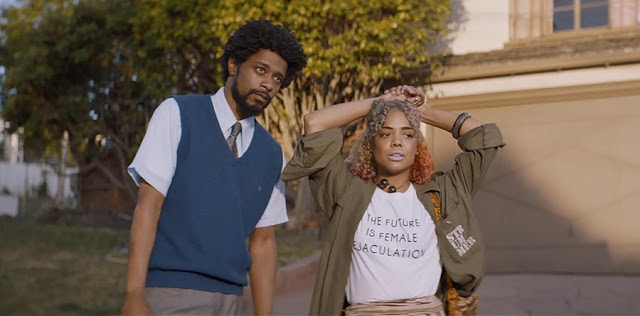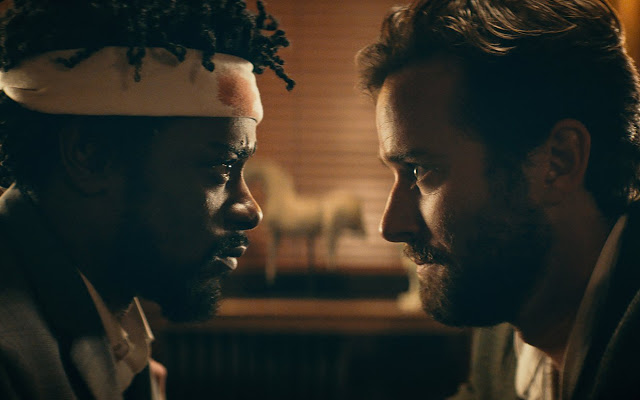A sizzling satire that’s overflowing with invention and ideas, Sorry to Bother You takes place in an America that is both entirely apart from our present reality and a disturbing reflection of it. Set in Oakland, it conceives of a land where prisons have become lifelong labor camps, where riot police attack striking workers with clubs, and where the biggest hit on TV is a moronic show called “I Got the Shit Kicked Out of Me!” Here I should clarify that this movie is a work of fiction, not a documentary.
Oh who am I kidding? Sorry to Bother You, the debut of writer-director Boots Riley, is such an extreme and provocative piece of work that nobody will confuse it with the intimately pitched, naturalistic dramas of Ken Loach or the Dardennes. But like those socially conscious filmmakers, Riley has something to say, and he’s saying it loud; excessiveness is his chosen cinematic language as well one of his foibles. Whether you hail Sorry to Bother You as a masterpiece or dismiss it as a mishmash—I’m inclined to think it’s a bit of both—you will likely agree that it’s a lot.
Its hero begins with little, though he undertakes a journey that gradually affords him wealth and status and that could be viewed, from one warped perspective, as a Randian triumph of perseverance and individual achievement. His name is Cassius Green (Lakeith Stanfield), and while people call him “Cash”, he doesn’t have much; in fact, he owns little beyond a bed in his uncle’s garage—which he shares with his girlfriend, Detroit (Tessa Thompson)—a doctored résumé, and a penchant for morose existential musings. Still, that’s enough to land him an entry-level job at a telemarketing firm named RegalView, where he has the unglamorous task of cold-calling pathetic marks and peddling them all manner of useless products and services.
It is during these initial pitches—which find Cassius and his desk suddenly crashing into his customers’ living rooms, watching in disbelief as he seemingly conducts face-to-face conversations with them when he’s really speaking over the phone—that Riley showcases his talent. As a writer, he’s gifted but somewhat undisciplined, occasionally struggling to corral all of his disparate ideas and shape them into a streamlined narrative. But as a director, he’s formally innovative and impressively self-assured. Even when Sorry to Bother You’s script threatens to collapse in on itself like an unbalanced Jenga tower, its visual style remains both flamboyant and composed; a mid-film montage that tracks a newly successful Cassius as he accumulates swag is a gorgeously edited display of fluid showmanship.
The strategy Cassius employs to acquire that success is the movie’s most powerful conceit, both technically and thematically. Initially struggling to make any sales—and thereby making minimal progress in ascending to the coveted status of “Power Caller”—Cassius receives sage advice from an old pro played by Danny Glover: “Use your white voice.” He then adopts not just a new speaking style but an entirely false persona, his tentativeness replaced by a cheery enthusiasm that allows him to create a rapport with the credulous saps who answer his calls. And because Riley does nothing halfway, Cassius’ “white voice” is a literal one; when he’s working clients, Stanfield’s deep delivery gets dubbed over in favor of the light, honeyed vocals of David Cross.
It is of course funny to hear one man’s words coming out of another man’s mouth—Marvel playfully used just such a bit with Michael Peña in both Ant-Man and its sequel—but there is something deeper and more sinister at work here. The implication behind Cassius’ use of this phony voice—the notion that black men and women must subjugate their own identities in order to advance within the corporate white world—may be dispiritingly familiar, but it lands here with considerable weight. And as Cassius literally rises within RegalView’s ranks—the power callers work on a higher floor, accessible only by way of a gilded elevator with an absurdly long keypad code—he is forced to continually integrate himself into the company’s synthetic, homogenized culture. (On his first day as a power caller, he learns from an unnamed colleague, played by Omari Hardwick but often voiced by Patton Oswalt, that it’s “white voice all the time” on this floor, regardless of whether you’re on the phone.) The price of professional success is the shedding of his black skin.
Or maybe he sheds it voluntarily. As portrayed by Stanfield, who so often embodies offbeat nonchalance on Atlanta (though my favorite performance of his remains Short Term 12), Cassius isn’t particularly motivated by ideology; he just wants a better life for himself. That pursuit of happiness places him in conflict with other minorities in his orbit, including Detroit, a performance artist with expressive earrings who grows increasingly militant and flirts with participation in an underground group called Left Eye. She also flirts with Squeeze (The Walking Dead’s Steven Yeun), a disgruntled RegalView employee who organizes a de-facto union and eventually finds himself staring down Cassius across a picket line.
Sorry to Bother You tackles a number of thorny political issues with fiery relish; in addition to racial stratification and labor strife, it addresses America’s prison epidemic through WorryFree, a financially thriving, morally bankrupt conglomerate that offers “lifetime contracts” in exchange for free room and board. (An early news clip informs us that Congress has determined that WorryFree’s practices do not legally qualify as slavery.) The challenge for Riley, which he meets most but not all of the time, is to smuggle his charged rhetoric within a colorful and irreverent package that is both intellectually stimulating and genuinely entertaining.
When it comes to Sorry to Bother You’s numerous satirical constructs, the mileage varies wildly. Some are both funny and thought-provoking, like the white voice, or the ridiculous animated promotional video outlining WorryFree’s expansion plans. Some attempt to be funny by way of being unfunny, like when an artistically paralyzed Cassius is egged on to “bust a rap” at a work party, then just ends up pathetically shouting “Nigga shit, nigga shit!” over and over, only for his white coworkers to find it spectacular. Some are tiresome, like the film’s purported send-up of the stupidity of reality TV, which ends with Cassius on camera covered in excrement and which feels about a decade stale; the same is true for a YouTube star who goes viral simply by plunking Cassius in the head with a soda can. And some are just odd, like Detroit’s art show, in which she stands half-naked on a dais and exhorts her audience to pummel her with whatever objects they can find.
Like I said, it’s a lot. And I can’t even reveal the movie’s most elaborate and far-reaching gag, except to say that it’s concocted by WorryFree CEO Steve Lift (Armie Hammer, excellent)—a fabulously egotistical presence whom we first meet snorting a line of cocaine the length of a yardstick—and that it sets a new standard in the field of animal labor.
That gag is as imaginative as it is upsetting, and in its anarchic vision of a mundane office space turned upside-down, Sorry to Bother You recalls Being John Malkovich, which memorably found John Cusack working on floor seven-and-a-half. (In a clever nod to another Charlie Kaufman-scripted film, that aforementioned WorryFree promotional video credits its director as “Michel Dongry”.) But while Riley does exhibit some of Spike Jonze’s whimsical brilliance, he lacks the latter’s intimacy of character; Cassius is such a passive presence that he ends up feeling distant from his audience. Similarly, while the film’s willingness to address a variety of social issues is laudable—it is only too happy to bother us—it lacks the allegorical clarity of Get Out, a more forceful denunciation of racial inequality.
All the same, it’s hard not to feel excited about Sorry to Bother You and the freewheeling way it blends fantastical storytelling, deceptive technique, and incendiary politics. The mantra at RegalView, drilled into Cassius from the jump, is “Stick to the Script”, yet it often seems like Riley’s making this stuff up on the fly. That accounts for the movie’s messiness but also its energy. Riley may be experimenting, but his filmmaking identity is clear. He doesn’t need to use anyone else’s voice.
Jeremy Beck is the editor-in-chief of MovieManifesto. He watches more movies and television than he probably should.



![[David Cross voice] Holla holla holla! [David Cross voice] Holla holla holla!](https://moviemanifesto.com/wp-content/uploads/2018/07/SorrytoBotherYou28champagne29.jpg)
